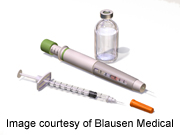
WEDNESDAY, Feb. 1 (HealthDay News) — The latest trial of a drug called GAD-alum to treat type 1 diabetes failed to show any significant improvement in the common markers of the blood sugar disease.
The researchers, however, said they felt there were possible reasons for the failure of the current trial, and that specific groups of people still might benefit from GAD-alum.
“Even if this study failed to reach its primary outcome, there were quite impressive results in certain subgroups, which supports the concept of using auto-antigens in the therapy of recent-onset type 1 diabetes,” said study author Dr. Johnny Ludvigsson, a professor in the division of pediatrics, in the department of clinical and experimental medicine at Linkoping University in Sweden.
Results of the study are published in the Feb. 2 issue of the New England Journal of Medicine. Funding for the study was provided by Diamyd Medical (the drug’s maker) and the Swedish Child Diabetes Foundation.
Type 1 diabetes is an autoimmune disease, in which the body’s immune system mistakenly attacks healthy cells. In the case of type 1 diabetes, the immune system attacks the insulin-producing beta cells in the pancreas. When enough beta cells have been destroyed, people with type 1 diabetes no longer produce enough insulin to properly metabolize the carbohydrates in foods. Carbohydrates become glucose in the body, which is used to fuel the body’s cells. If people with type 1 diabetes don’t take insulin (through injections or an insulin pump), their body’s cells can’t use the glucose and blood sugar levels rise to dangerous levels.
There are several autoantibodies (also called autoantigens) that can cause the destruction of beta cells in type 1 diabetes. One such autoantibody is called GAD65. Not everyone with type 1 diabetes has GAD65 autoantibodies, but many do. Dr. Jay Skyler, deputy director of clinical research at the University of Miami’s Diabetes Research Institute, said that about 80 percent of people with type 1 likely have GAD65 autoantibodies.
GAD-alum was designed to work like a vaccine, hopefully stopping the autoimmune attack soon after it has begun, to preserve beta cell function.
“GAD-alum takes a vaccine kind of approach, and takes the antigen in the autoimmune disease and tries to give it in a way that will vaccinate people so they don’t have the destructive autoimmunity,” explained Skyler.
Previous research, done by the same group, showed positive effects from the treatment, especially in those treated less than six months after being diagnosed with type 1 diabetes, according to the study.
The current study included 334 people between the ages of 10 and 20. All had type 1 diabetes for less than three months, and they had GAD autoantibodies.
The patients were randomly assigned to one of three treatment groups: four doses of GAD-alum; two doses of GAD-alum followed by two doses of placebo; or four doses of placebo.
The most important measure the researchers looked for was levels of C-peptide. C-peptide is a byproduct of insulin production, so rising levels of C-peptide indicate increased levels of insulin. The researchers also measured how much insulin people needed, their average blood sugar levels over the study period, and how often they experienced low blood sugar levels.
While GAD-alum appeared safe and was very well tolerated in this study, it didn’t significantly reduce levels of C-peptide, improve blood sugar levels or lessen the need for insulin, according to the study.
Ludvigsson said there may be several reasons that the initial research looked promising, yet this study failed to deliver positive results. One is that they allowed flu vaccines to be given at the same time this trial was ongoing, which could have affected the immune system response somehow, he said. Also, the age of the patients may alter the results of the trial because younger patients tend to lose beta cells faster, he noted.
Skyler said the first study showed promise only in a small subgroup of patients, not in the entire group. “You can’t draw firm conclusions from pilot studies. There are a lot of things that look quite promising that don’t pan out,” he said.
But, Skyler added, “I personally don’t think we should abandon GAD; I think we should think about the form it’s in, and the route it’s given.”
Ludvigsson said further trials of GAD-alum are already on the way, using the drug as an intervention for people recently diagnosed with type 1 diabetes and as a preventive measure for people who have a high risk of developing type 1 diabetes.
More information
Learn more about type 1 diabetes from the American Diabetes Association.

